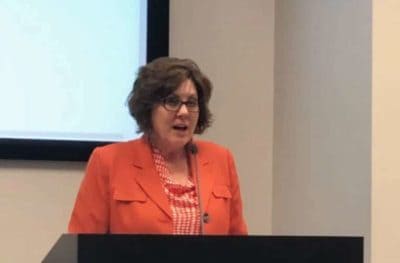

The Rowan-Salisbury School System revealed plans for each of its schools under its new renewal status on Friday at a reservations-only luncheon.
The large room was packed with community leaders, philanthropists, and business owners. Elected officials from each of the county’s 10 municipalities were present, as well as Senator Carl Ford, R-Rowan, Rep. Harry Warren, R-Rowan, and Rep. Craig Horn, R-Union, who authored the legislation that created the renewal school system.
Local banker Steve Fisher introduced district superintendent Dr. Lynn Moody, saying, “Einstein said that doing the same thing and expecting different results is the definition of insanity. If we don’t change, we are going to get the same results. Our superintendent has the courage for change.”
Moody began with a recap of the district’s work since the renewal school system legislation was passed in June 2018. The local school board approved proceeding with renewal a week later, and the State Board of Education approved it in August. Teacher-led design teams were implemented in each school. These teams worked all year to identify the issues their own students face and the issues their school faces with the students, and developed a plan to address their unique student population.
Teachers took trips to model schools and businesses to consider their approaches to similar problems. The trips were paid for by a local foundation.
Moody reviewed her “Renewal Directional System,” which features three focuses for the district’s schools under renewal:
- Academic skills: Mastering fundamental standards in English, math, science and social studies.
- Interpersonal skills: Development of creativity, leadership, teamwork, civility, work ethic, communication and problem solving.
- Unique life goals: Setting goals based on each student’s unique smartness, career aspirations, and personal passions.
At this time, three of the district’s school plans have been approved by the local board of education and those schools are in the process of implementing those plans. Many schools will present their plans to the school board for approval on May 28. Some schools are still working on plans. These schools may have undergone a change in leadership or were being considered for closure under another initiative of the district: school consolidation.
Moody revealed the renewal “book,” a virtual publication available here. The book lists the plans for each school in the district. Each school plan identifies the school’s renewal vision, three needs of its students, strategies for each of the needs, measurable goals and timelines, directional student alignment, and which flexibilities are used.
Moody smiled as she said the book will likely never be published in paper form, as the plans will move and change as the schools mature in their renewal process.
The legislation that created the renewal school system enabled the district to grant several “flexibilities” to the schools. The district defined several flexibilities for implementation and required each school to identify which it wanted to take advantage of.
The defined flexibilities are calendar, curriculum, budget, personnel, and schedule. Each school may choose to use some, all, or none of the flexibilities.
For example, China Grove Elementary School’s plan has already been approved by the local school board. Its vision is to pursue A+ certification as an Arts Integration School.
Among the school’s challenges, the renewal book says, are that “students at China Grove Elementary School often struggle to self-regulate, use socially appropriate behaviors and exhibit difficulty staying on task and persevering through difficult tasks.”
The strategy for that challenge is listed as: “Research has shown that participation in the arts increases student attendance, fosters grit and promotes collaboration. By participating in arts integration activities, students will learn to cope and express their emotions so they may be fully engaged in their learning.”
The first of the school’s seven goals is to implement all A+ Essentials and perform at a model school level by 2024.
The school is using calendar, curriculum, and personnel flexibility. The Directional System Alignment states, “Student interpersonal skills will be developed as the arts allow for collaboration, self-expression, problem-solving, decision-making and creativity. Our focus allows students to have exposure to the arts. This facilitates students’ discovery of the ever-changing world and individual paths.”
Overall, the system has 14 schools in “implementation phase,” meaning they have clearly defined a focus aligned to the schools’ needs assessments.
Fifteen of the schools are in planning phase, meaning they’re still connecting interventions into a comprehensive focus but have strong ideas and interventions; and are still planning and garnering feedback.
Five of the schools are in creating phase, meaning they’re still analyzing data and brainstorming ideas, and need more support and time to develop their own plans.
Of the 14 schools in implementation phase, three have already been approved by the board. Eleven will present their completed plans to the board on May 28.
The schools in implementation phase are:
|
China Grove Elementary |
A+ Arts Integration (approved) |
|
Hanford Dole Elementary |
Developing the Whole Child (challenge-based learning) |
|
Isenberg Elementary |
Global Academy (approved) |
|
Knollwood Elementary |
Expeditionary Learning |
|
Landis Elementary |
Growing Learners for a Lifetime |
|
Overton Elementary |
Supportive School Community |
|
Knox Middle |
Accelerated Learning Communities (approved) |
|
Southeast Middle |
Building Connections |
|
West Rowan Middle |
Sustainability Academy |
|
East Rowan High |
Personalized Pathways for Success |
|
North Rowan High |
Center for Entrepreneurship and Design |
|
Salisbury High |
The STEM Experience |
|
South Rowan High |
Pivotal Personalized Pathways – Flipping the Core |
|
West Rowan High |
Problem-Based Learning Environment |
Moody assured the crowd that the system will continue to utilize Orton-Gillingham phonics throughout to ensure a strong foundation in reading. She recalled riding the bus for the summer meals program last year and stopping at a mobile home that had no front door, only a piece of cardboard. Yet in the front yard was one of the district’s signs proclaiming: “An Extraordinary Reader Lives Here.”
“We acknowledge we have a lot to learn,” said Moody. “The best part of renewal has been taking off the walls that kept us from thinking differently. We have a lot of work to do. We talked with the legislature about how long this will take. We were given five years; we are in the ninth month.”


